
Proper hosting is essential for starting a website. Choose the wrong one, and you’ll be doomed forever. Cloudways and Bluehost seem like excellent options; if you’re stuck between the two, we understand your struggle. While Cloudways offers exemplary cloud hosting services, Bluehost is managed WordPress hosting. The former offers comprehensive computing resources, while Bluehost focuses on ease of use and incredible hosting variety, including cloud hosting; take that, Cloudways!
As interesting as the proposition is, we ultimately found Bluehost better overall. However, Cloudways offers many features and options you’ll surely want to consider. Our Cloudways vs Bluehost comparison explains everything you should know about both to make an informed decision.
So, let’s get down to business.
Cloudways vs Bluehost: Key Features Compared
| Cloudways | Bluehost 🏆 | |
| Types of Hosting | Cloud | Cloud, shared, managed WordPress/WooCommerce, VPS |
| Storage Size | Up to 3,840 GB | Up to 100 GB (225 GB for cloud hosting) |
| Bandwidth | Unlimited | Unlimited |
| Hosted Websites | Unlimited | Up to 100 websites |
| Backups | Daily and on-demand | Automated, weekly |
| Starting Price | $14 per month | $3.95 monthly |
| Money-Back Guarantee | No (3-day trial) | 30 days |
| Ease of Use | Not for beginners | Great for beginners |
| Site Migration | Free | Free |
| Free Domain | No | Yes |
| Free CDN | No (bought separately) | Yes |
| Security | Free SSL, DDoS protection, server-level firewall with IP-blocking, and WordPress vulnerability scanner (malware protection is bought additionally) | Free SSL, DDoS protection, malware scanning, WAF, WordPress vulnerability scanner, Domain Privacy (Business Plan), automatic plugin updates, 24/7 site monitoring |
| Email Accounts | No (bought additionally) | Yes, free for a year |
Plans and Pricing
Our Bluehost vs Cloudways comparison for 2025 begins with likely the most essential aspect. Their plans and pricing. At the start, we mentioned that Cloudways offers cloud hosting services, but it’s more of a reseller. This means it doesn’t sell its own services.
Instead, it offers cloud hosting server resources from third-party companies. They include DigitalOcean, Vultr, Linode, AWS, and Google. It’s good to know that DigitalOcean owns Cloudways, so technically, its resources don’t come from a third-party company.
Bluehost isn’t a reseller, so it sells its own hosting services. Because it’s not strictly a cloud hosting service, it offers a better variety. Here’s a table that highlights that:
| Hosting Type | Bluehost | Cloudways |
| Shared | ✅ | ❌ |
| Dedicated | ✅ | ❌ |
| VPS | ✅ | ❌ |
| Cloud | ✅ | ✅ |
| WordPress/WooCommerce | ✅ | ❌ |
| Reseller | ✅ | ❌ |
Bluehost’s fully managed WordPress and WooCommerce hosting is part of all shared hosting plans. Meanwhile, Cloudways offers semi-managed WordPress hosting by default, with the option to choose Cloudways Autonomous as a fully managed WordPress option.
Alas, at a higher price.
Bluehost vs Cloudways Pricing Comparison
Let’s discuss their prices. Here’s a basic overview of Cloudways’ plans:

The Flexible version, the most popular one, starts at $14 for the Micro plan from Digital Ocean. You can use the toggle above to switch from Premium to Standard plans, lowering the initial price to $11 monthly. Cloudways offers many other plans and even types of plans, as shown in the screenshot.
They wildly differ in hosting resources, offering different amounts of RAM, bandwidth, NVMe storage, and the number of vCPU cores. You can spend about a dozen quid or thousands on XL plans from AWS or Google Cloud, which makes Cloudways highly flexible and scalable.
Meanwhile, its Autonomous plans start with Plan 1, which costs $35 monthly to host one website. These plans are poor value for money because they severely restrict bandwidth and disk space.
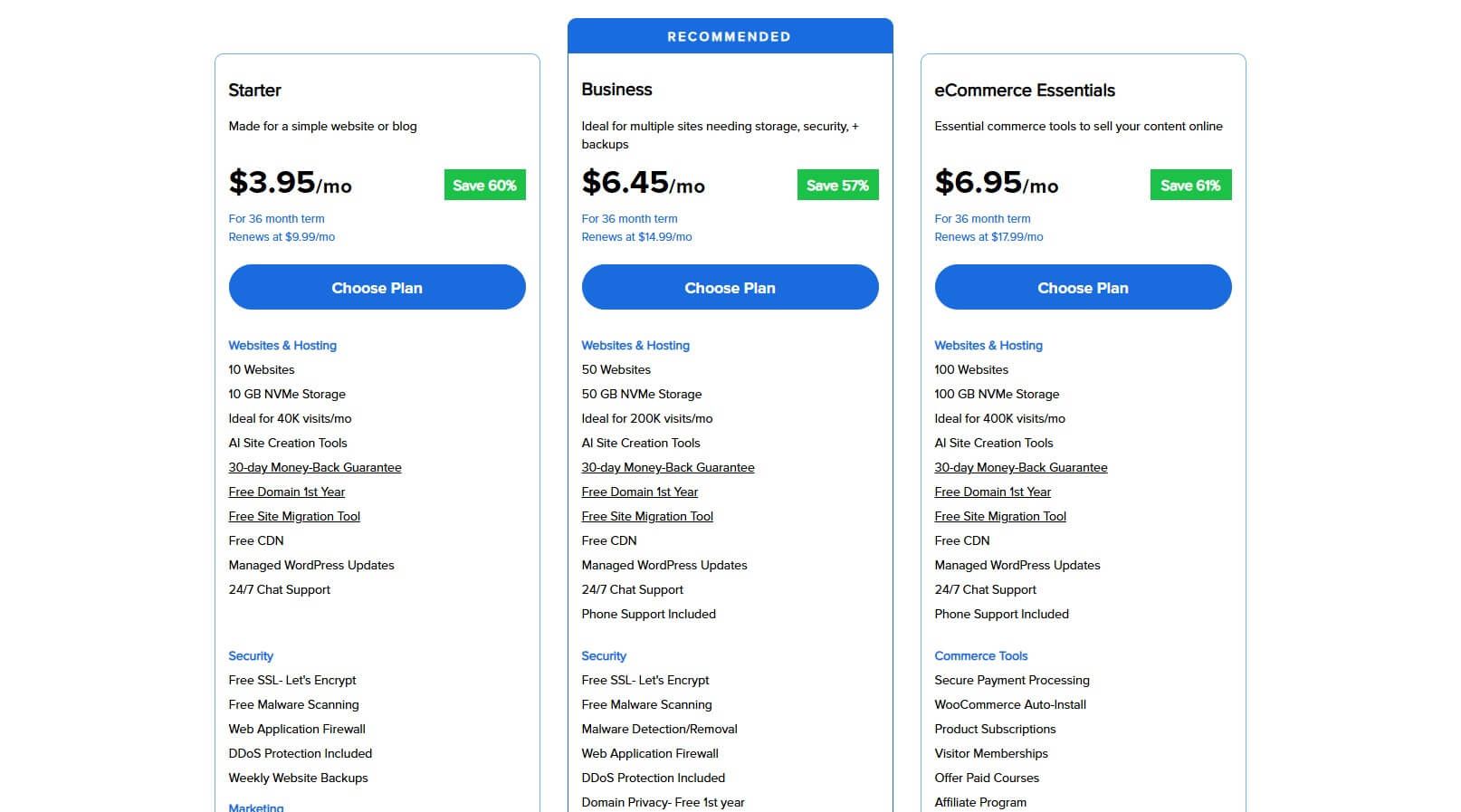
Bluehost starts at $3.95 monthly, but we highly recommend the mid-tier Business plan at $6.45 monthly. It’s still roughly half the price of Cloudways and includes NVMe storage, a free domain for a year, which Cloudways lacks, and a handful of managed WordPress hosting features.
Bluehost offers cloud hosting plans, but they’re expensive. The Cloud 10 plan starts at $75 monthly. However, you get extreme compute power, with at least 20 vCPU threads, SSD storage, unrestricted bandwidth, premium security, Global Edge caching, and malware protection.
At this price, Bluehost offers more than Cloudways’ equivalent, which would likely be the 2XL plan from Vultr with 32 GB of RAM, 16 vCPU cores, and 300 GB of NVMe storage at $420 monthly.
It’s worth noting that Bluehost’s cloud hosting is flexible, as you can customize your own plan. When we wanted to do this, we realized that Bluehost is nearly, if not as flexible and scalable as Cloudways, but at a lower price. Such a tremendous service.
Money-Back Guarantee & Refund Policies
What if you don’t find your footing? Can you get a refund?
Of course. Bluehost offers a 30-day money-back guarantee for all plans, but you must first invest in the given plan. Cloudways has a 3-day free trial without a credit card, so it’s easier to get into it. Unfortunately, Cloudways doesn’t issue refunds unless you have a good reason.
While three testing days are welcome, they’re insufficient to test the service properly. Meanwhile, 30 days in Bluehost sounds much better, as you have an entire month to examine its nooks and crannies, with the only downside of spending money immediately.
Both solutions are fine, but we prefer Bluehost’s. Finally, to address the previous discussion, Bluehost offers more for less money, ultimately making it the winner of the first comparison round.
🏆 Winner: Bluehost
Hosting Management: Which Hosting is Easier to Use?
It’s time to see which hosting is simpler to use. Before we explain our choice, let’s pronounce the winner: Bluehost. In a second, you’ll know why we love Bluehost and its well-known approach to hosting management.
Initial Setup
Both providers let you set up your hosting environment in minutes. To an extent.
Bluehost’s provision of a free domain simplifies things. Moreover, as it offers managed WordPress hosting, you can preinstall WordPress and WooCommerce for more convenience. Remember the free domain from before? You can make a valid website and publish it once you’re done!
Bluehost takes care of your SSL, which it automatically applies. Meanwhile, you’ll claim your free domain during website creation without waiting for DNS propagation, connecting your domain to the server, etc.
Cloudways doesn’t have a free domain. It doesn’t even let you buy one from its site!
This means you must buy a domain from a third party. From here, you’ll register for Cloudways, preinstall WordPress (yes, that’s an option!), and point the domain to a server. After that, you’ll have to wait for DNS propagation and manually apply your Let’s Encrypt SSL.
While the two additional steps won’t be so problematic, beginners will feel more at home with Bluehost, which automatically handles these mundane tasks, especially domain-related ones, which beginners find perplexing.
Hosting Management
Apart from a few setbacks in the beginning, Cloudways is otherwise straightforward.
The in-house panel offers everything you need on the home screen. You can even install an app with a single click, which is how we installed WordPress on a few websites. The in-house panel lets you sign in to WordPress and access your admin panel in seconds. Meanwhile, the menu on the left offers access to other settings.

One is staging, where you can create a carbon copy of your website and test new features. After that, you can apply them to the live version or “pull” the elements from the live version to the testing version.
Bluehost’s control panel lets you access vital parameters like website security, business email, SSL certificates, and more.
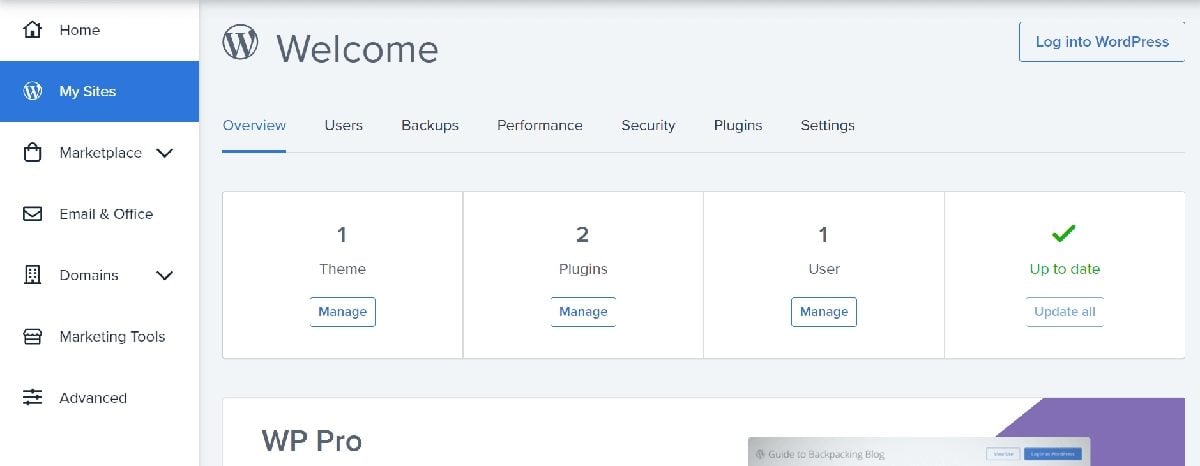
However, as one of our favorite hosting providers, it also leverages cPanel. We’re sure you’ve heard of it and know how impressive and straightforward it is.
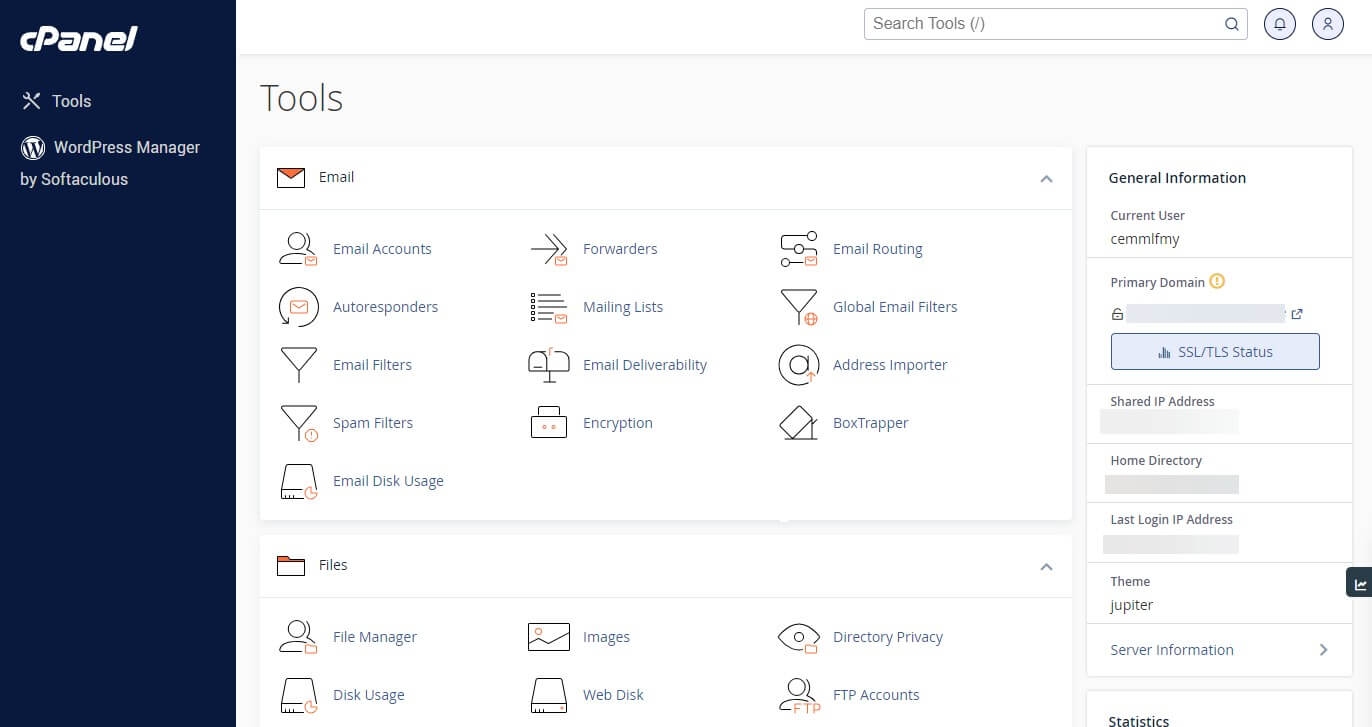
cPanel offers a search bar, enabling you to find specific tools in seconds. Moreover, you can pin your favorite tools at the top for easier access. cPanel-specific tools like email routing, spam filters, and Softaculous are there, and we especially like the latter, as it’s a one-click installer of different applications.
If you like cPanel hosting, Bluehost will undoubtedly spark your interest. Overall, we found Bluehost just a tad simpler to navigate, particularly during the initial setup phase, which is why it takes the second round.
🏆 Winner: Bluehost
Cloudways vs Bluehost Features
At the start of our Bluehost vs Cloudways comparison, we clarified that Bluehost costs less and provides better value for money. To further clarify what we meant, we’ll discuss their essential features.
To be clear, their features differ based on the chosen plan. However, some are available in all plans and are deemed essential. We’ll focus on them and briefly discuss optional features.
Cloudways offers these features in all plans:
- Unlimited websites and visitors
- Staging environment
- Object cache pro – Redis cache
- Automated backups
- Free SSL
- Free website migration
- Vertical scaling
Bluehost’s essential features include:
- Free domain for a year
- Free Site Migration tool
- CDN (Content Delivery Network)
- Managed WordPress
- Automated weekly backups
- AI website builder
- Pro Email Free Trial
- Email Marketing (Creative Mail)
- Static content caching
- Object caching
- WordPress staging
Examining their features makes us conclude that they’re very different.
We prefer Bluehost’s features because they include a free domain and CDN, which cost extra when you choose Cloudways (read our Cloudways review for more context). Bluehost also includes a helpful AI website builder, which greatly aids website creation. Cloudways offers nothing similar.
Perhaps the most striking difference is how they handle WordPress.
Bluehost automatically updates WordPress and associated plugins as a fully managed hosting provider. Meanwhile, Cloudways charges extra for this and many other features. We’ll discuss that in the security round, where Cloudways has seriously dropped the ball.
For now, we’ll confirm Bluehost’s superiority and declare it the winner.
🏆 Winner: Bluehost
Speed & Uptime Tests: Which Web Hosting Performs Better?
Which hosting performs better in 2025? To find out, we tested their best and most popular subscription plans. Our Bluehost testing was performed on its Business plan, while Cloudways testing was performed on the Medium plan from DigitalOcean, with 4 GB of RAM, two vCPU cores, and 4 TB of bandwidth.
Our tests were straightforward.
We subscribed to both services, installed WordPress, and made two identical websites using the Astra theme. We also uploaded identical images and wrote a handful of random blog posts. Finally, we should mention our data center location in the United States.
Bluehost offers US-only servers, while Cloudways offers a wide range of data center locations, making it a bit more versatile for performance-oriented websites.
Uptime & Response Time Results
Okay, so let’s first analyze their uptime and response times. We used Loader and Pingdom for this part, which we found relatively straightforward. When we fired up Loader and sent 1,000 virtual clients in a minute, we achieved these results with Cloudways:
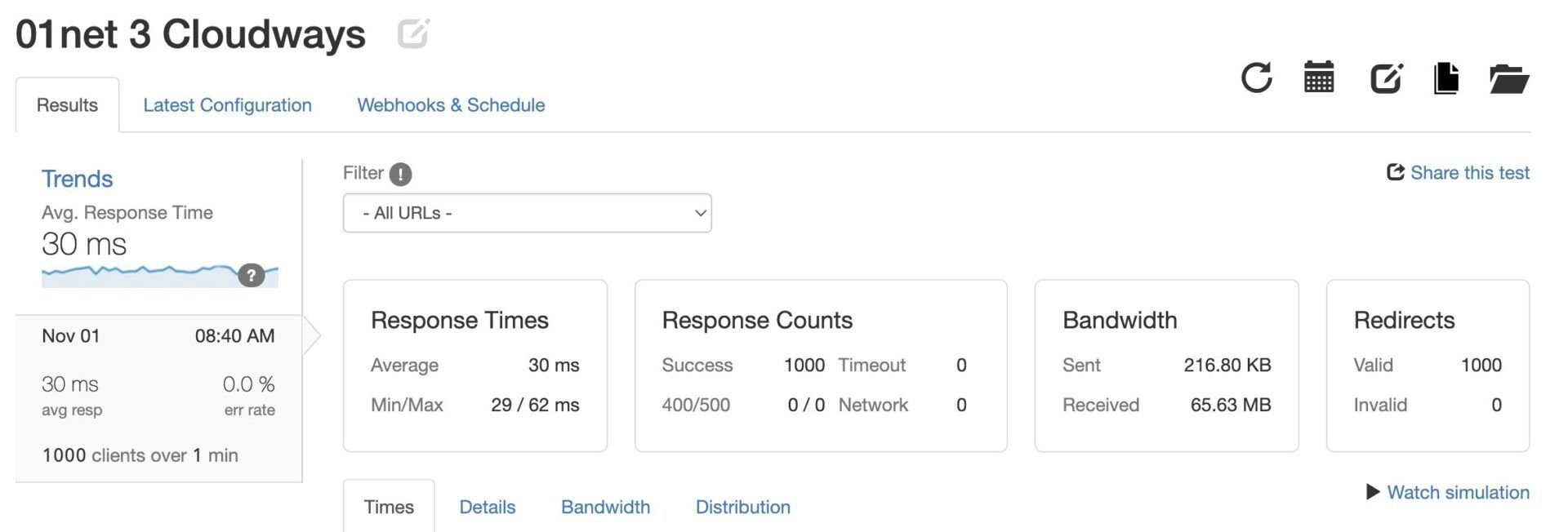
We did the same with Bluehost and got these results:
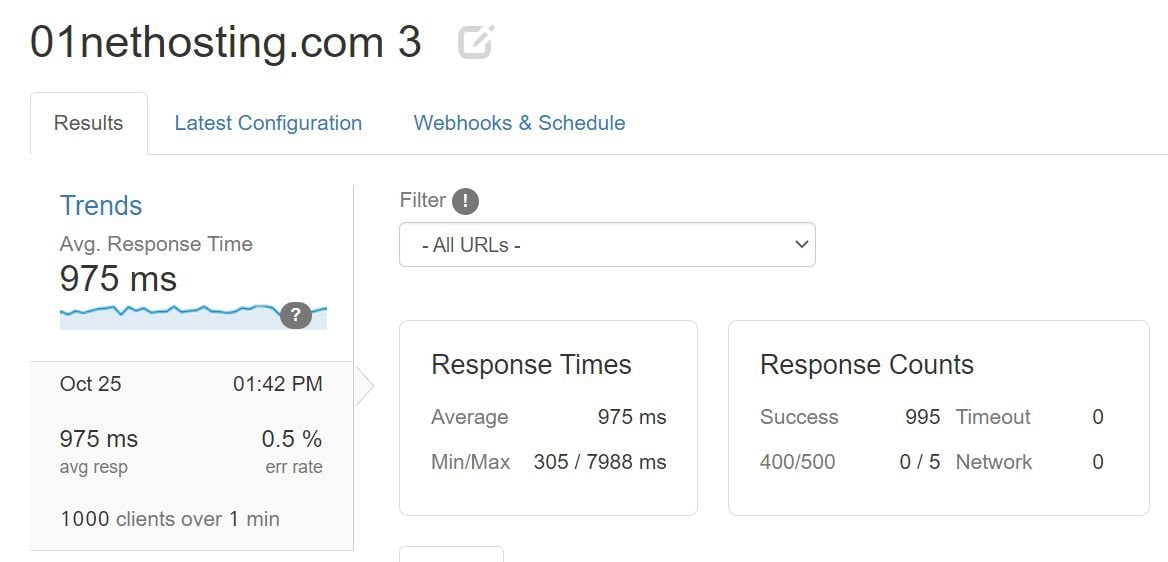
Bear in mind that 1,000 clients in a minute is a more extreme test, but interestingly, Cloudways passed it with flying colors, with an average response time of only 30 ms. The maximum was 62 ms.
Bluehost’s average of 975 ms was terrible. The minimum of 305 s is “okay”, but the maximum of eight seconds implies that Bluehost couldn’t handle a severe traffic surge without faltering.
How do less severe conditions (50 virtual clients) impact them? Here’s what we got from Cloudways:

Here’s what we got from Bluehost:
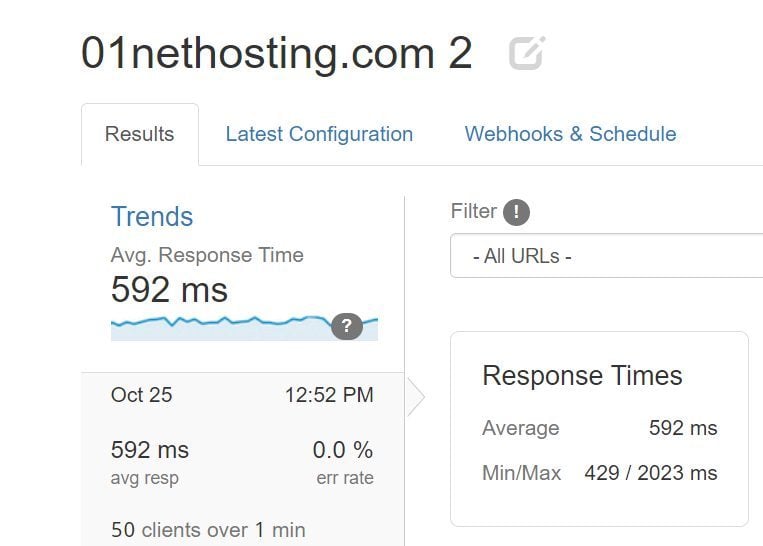
Cloudways virtually repeated its success, with Bluehost, again, displaying an extremely high average response time of 592 ms.
Don’t think it has to do with shared hosting. The best shared hosting providers, like Hostinger and SiteGround, have multiple times lower averages than Cloudways, which means something’s wrong with Bluehost’s servers. We’ll leave that to its experts to find out and fix.
For now, here are our uptime results from Pingdom (tested in the past two months):
- Cloudways has achieved a 99.90% uptime
- Bluehost has achieved a 99.96% uptime
Bluehost was a speck better, but nothing out of this world. However, Cloudways was considerably better in our response time tests.
Page Load Speed Comparison
It’s time for page loading speeds, which we measured on GTmetrix using the Vancouver server. As always, we observed five crucial page-loading parameters that include:
- TTFB or Time to First Byte
- FCP or First Contentful Paint
- LCP or Largest Contentful Paint
- FLT or Fully Loaded Time
- TTI or Time to Interactive
After performing a few tests on both sides, we settled for their best results.
So, here’s how Cloudways performed:
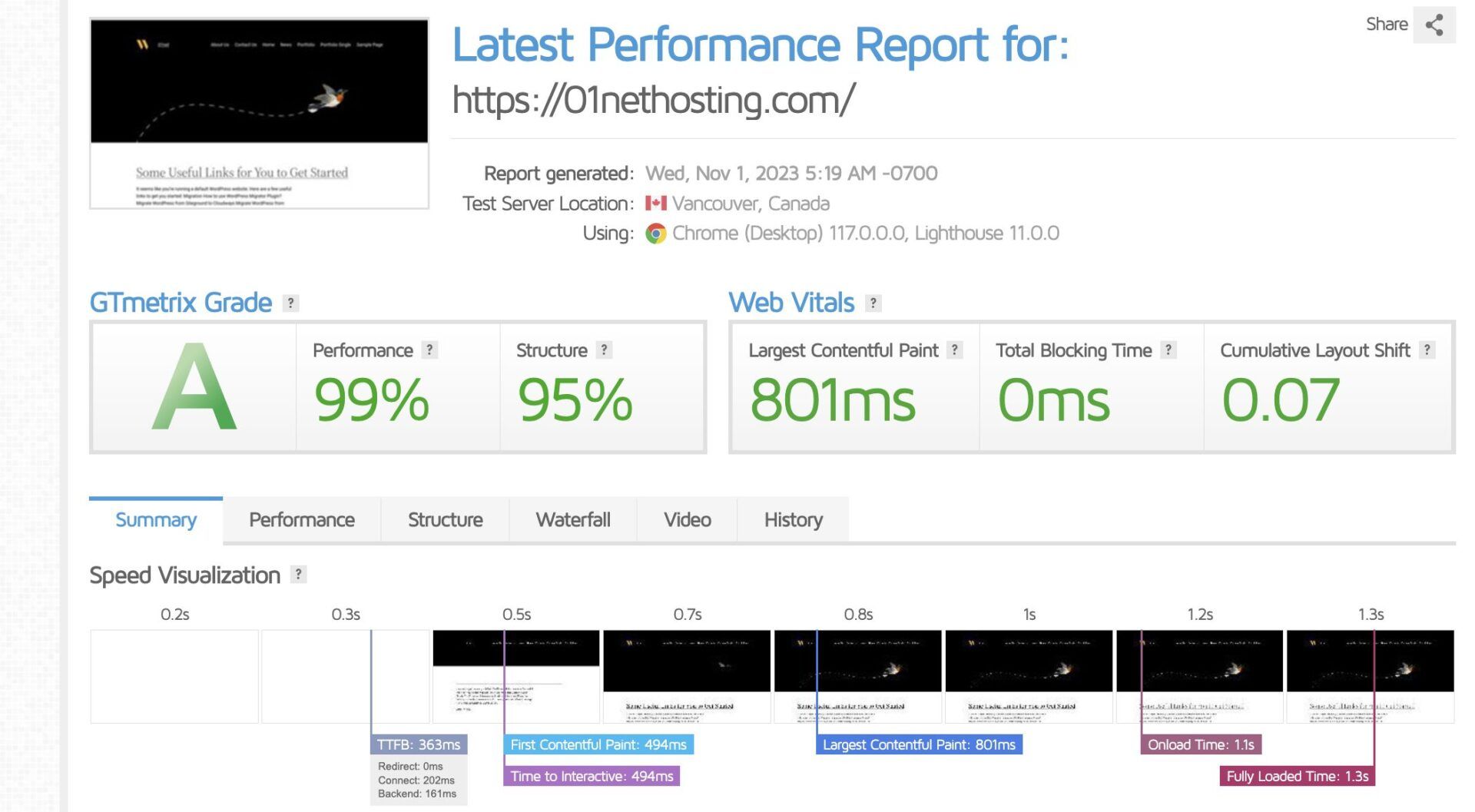
Here’s how Bluehost performed:
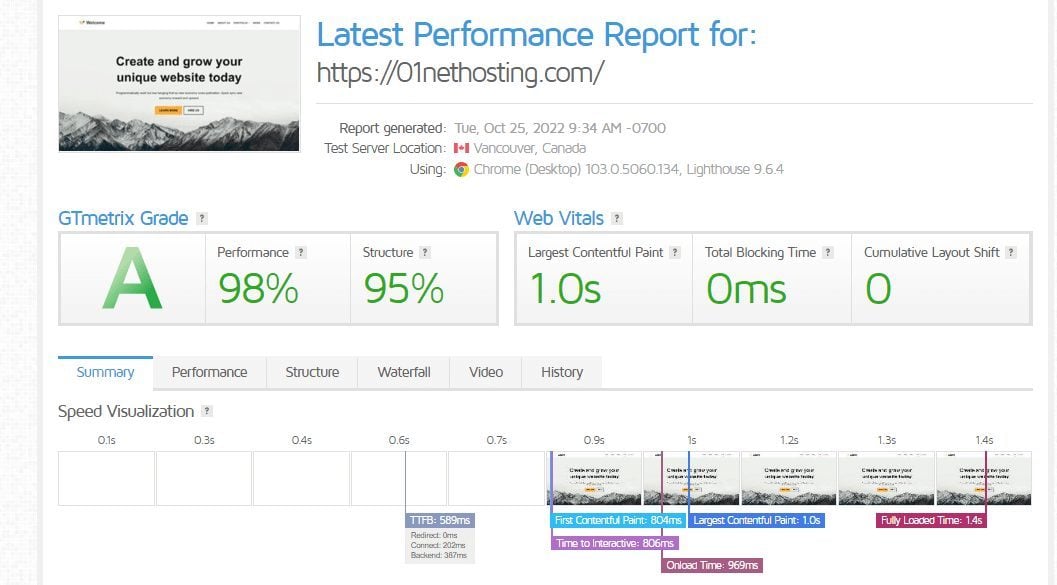
Refer to the table below for a direct Cloudways vs Bluehost loading time comparison:
| Cloudways | Bluehost | |
| TTFB | 363 ms | 589 ms |
| FCP | 494 ms | 804 ms |
| LCP | 801 ms | 1.0 s |
| FLT | 1.3 s | 1.4 s |
| TTI | 494 ms | 806 ms |
Bluehost’s unimpressive performance couldn’t come close to Cloudways, which ultimately defeated its rival in all performance-related tests.
🏆 Winner: Cloudways
Security: Which Web Host Is the Safer Option?
In our Bluehost vs Cloudways duel, we examined their security and discovered that Bluehost was a superior option. If you check out Bluehost’s plans, you’ll see persistent security features, such as:
- Free SSL
- Malware scanning
- DDoS protection
- Web Application Firewall
- Automated backups (weekly)
- Domain privacy for a year (Business plan)
Purchasing one of its cloud hosting plans gives you everything we mentioned plus uptime monitoring, real-time backups, and 24/7 security scans. This means Bluehost has everything out of the box, while Cloudways, with its shallow offers, excludes some of the most essential tools. It includes:
- Firewall with IP blocking
- Auto-healing servers
- Automated backups (daily)
- DDoS protection (Imunify360)
- Free SSL
- WordPress vulnerability scanner
There’s no domain privacy, malware scanning, or automatic WordPress updates.
Luckily, you can purchase them if you’re willing to pay extra. Malware protection is $4 per site monthly, while automatic WordPress updates are $3 monthly. Cloudways even charges you extra for mailboxes; $1 per mailbox monthly. Bluehost includes a professional email for free for a month.
We recently compared Cloudways to Hostinger, and the former lost. This time, it’s no different because Bluehost, like Hostinger, packs all the security essentials, and more, in its plans, rather than trying to sell them to you separately.
🏆 Winner: Bluehost
Customer Support
Let’s finally compare their customer support teams, which we think are some of the most impressive. Bluehost and Cloudways work 24/7 and deploy support team agents who can help you via live chat. Click the bubble on the site, provide some basic information, and you’ll get in touch.
Both companies respond almost instantly, and you’ll rarely wait more than a few minutes. Depending on the problem’s scope, it’s either solved on the spot or transferred to a higher instance of support, which takes some time to get back to you.

We found Bluehost’s phone support excellent, but since it’s available only in the eCommerce Essentials plan, not every user can experience it. Cloudways doesn’t have phone support, but offers advanced support that extends to themes, plugins, performance optimization, etc.
Can you guess the issue? It costs $100 monthly on top of your subscription; oh, no!
Luckily, it’s unnecessary unless you’re inexperienced and want help with every aspect of your hosting. In that case, you wouldn’t choose Cloudways, as Bluehost is a better option.

In addition, both providers have extensive knowledge bases, many tutorials, and FAQs that mostly cover everything. Based on our experience with each, we can comfortably say they do their jobs well and deserve points in this round, which ultimately leads to a tie.
🟰 Winner: Tie
Cloudways vs Bluehost: The Final Verdict
Today’s Cloudways vs Bluehost comparison for 2025 was more than exciting. However, it’s time to compile our test results and give you our final two cents. Bluehost defeated Cloudways based on the score.
During our testing, we found Bluehost to be better for hosting WordPress websites. It also offered superior ease of use, security, and value for money. Meanwhile, Cloudways offered superb performance, excellent flexibility, and a user-friendly in-house panel for hosting management.
After all, you’ll pay less for Bluehost and be able to squeeze more if we exclude its lukewarm performance and loading times. However, if you prioritize performance and aim for scalable cloud hosting plans, while not necessarily wanting fully managed WordPress hosting, Cloudways is a solid option.